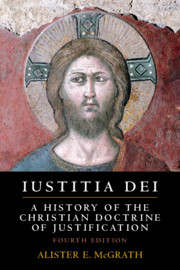Book contents
- Iustitia Dei
- Iustitia Dei
- Copyright page
- Contents
- Tables
- Preface to the Fourth Edition
- Abbreviations
- Introduction
- Part I Justification
- Part II The Middle Ages
- Part III Protestantism
- Part IV Catholicism
- Part V The Modern Period
- 27 The Enlightenment
- 28 The Long Nineteenth Century
- 29 Contemporary Renewal
- Conclusion
- A Brief Glossary of Medieval Soteriological Terms
- Works Consulted
- Index
28 - The Long Nineteenth Century
Retrieval and Reconfiguration
from Part V - The Modern Period
Published online by Cambridge University Press: 27 January 2020
- Iustitia Dei
- Iustitia Dei
- Copyright page
- Contents
- Tables
- Preface to the Fourth Edition
- Abbreviations
- Introduction
- Part I Justification
- Part II The Middle Ages
- Part III Protestantism
- Part IV Catholicism
- Part V The Modern Period
- 27 The Enlightenment
- 28 The Long Nineteenth Century
- 29 Contemporary Renewal
- Conclusion
- A Brief Glossary of Medieval Soteriological Terms
- Works Consulted
- Index
Summary
Chapter 28 deals with developments in thinking about justification during the ‘Long Nineteenth Century’ – the period between the French Revolution of 1789 and the outbreak of the First World War in 1914. The chapter deals with the issue of retrieval and reconfiguration of the doctrine of justification, partly in reaction to the critical overstatements and rationalisations associated with the Enlightenment. There are three main sections in this chapter, the first deals with F. D. E. Schleiermacher’s retrieval of the subjective aspects of the doctrine of justification in response to the moralising accounts of the doctrine developed by Enlightenment writers such as Töllner and Steinbart. The second is John Henry Newman’s 1837 reassessment of the doctrine’s implications for ecclesiology. Although Newman’s historical analysis is seriously flawed, it shows how the doctrine has an ongoing history of use in the modern period. The third is Albrecht Ritschl’s substantial programme of retrieving and reconfiguring the objective aspects of the doctrine, set out in the three volumes of his Christliche Lehre von der Rechtfertigung und Versöhnung (1870–2). This important set of works uses historical analysis to demonstrate that aspects of the doctrine can be retrieved, rather than being rendered obselete by historical progress.
Keywords
- Type
- Chapter
- Information
- Iustitia DeiA History of the Christian Doctrine of Justification, pp. 356 - 376Publisher: Cambridge University PressPrint publication year: 2020



